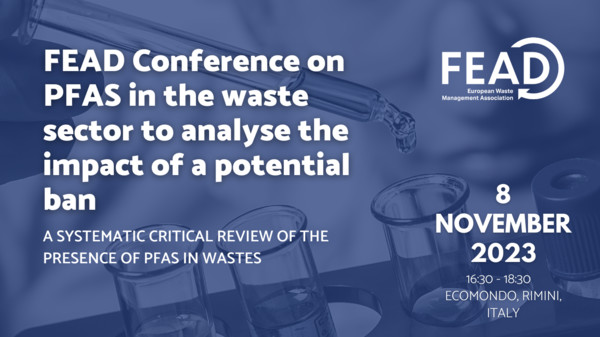PFAS: A HASTY GENERAL BAN COULD HAVE DIRE CONSEQUENCES FOR THE WASTE MANAGEMENT INDUSTRY
Several Member States of the European Union have proposed a general ban on a group of chemicals known as PFAS. In order to give Member States a better overview of the situation, FEAD will conduct a critical review of ECHA’s study.
On 5 April 2023, The European Chemical Agency (ECHA) presented a study on Per- and polyfluoroalkyl substances, also known as PFAS or PFASs. Spearheaded by several countries, Germany, the Netherlands, Denmark, Norway, and Sweden who have drawn up a restriction proposal concerning PFASs in Europe, the study states that the chemical should be massively restricted. While the substance is already being largely regulated, if this restriction proposal goes through, it will be one of the largest ever on chemical substances in the EU, as PFAS currently represents more than 10.000 substances.
What are PFAS?
PFAS are a group of chemicals that have attracted public attention since the 90s and are increasingly the subject of debate in the scientific community. According to ECHA’s PFAS study, the use of the chemical is more and more common and can be found in virtually everything: "drinking water, vegetables, cleaning products, water-resistant fabrics such as jackets, umbrellas and tents and personal care products". This omnipresence of the chemical is the main reason FEAD, the European Waste Management Association, deems it necessary to conduct a critical review of the study. Unlike any other sector of the economy, Waste Management is the mirror image of the whole economy. Furthermore, the Waste Management sector is at the centre of the Circular Economy. Its activities can provide the European Union with the materials needed.
FEAD critical review
The waste stage is as much a critical part of the life cycle of a substance as any other and that is whether it is in a mixture or in an article. Therefore, its distribution via the supply chain including service-life of articles and waste stage as an emission source with its associated risks should be considered. An understanding of Waste Management and the fate of PFASs in the waste stage is therefore critical. It is crucial in order to understand the impacts on circular economy and life cycle emissions. FEAD’s objective is to deepen the knowledge of PFASs presence in relevant waste streams, and to understand how this could influence current and future Waste Management practises considering continuous updates of the relative legal framework.
To do so, a systematic critical review of the scientific literature is being performed in collaboration with the University of Padova, to collect PFASs concentration ranges in waste items categorized within relevant four waste categories: plastic waste; paper and cardboard waste; textile and leather waste; metal waste. The concentrations identified in the critical review will later be compared with waste samples collected by the Waste Management sector provided by different countries to ease the understanding of their impacts on waste management. Further, statistical analysis will be carried out to better interpret the collected data. This critical review, a first of its kind, will allow Member States to have a better overview of the situation, allowing us to put in place measures that better suit each situation instead of a general ban that might ignore the particularities of certain cases.
Results of critical review
To present the results of the first part of this critical review, FEAD will be present at ECOMONDO. Indeed, on the 8th of November, we will be presenting the results of our own study and conducting a panel discussion on the issue. The initial presentations will be followed by a panel discussion and then a general debate between speakers and the crowd. The panel will include various guests' speakers, all experts in different areas concerning this chemical, to have the most conductive discussion on the subject.

ABOUT FEAD: The European Waste Management Association, more commonly known as FEAD, is a Brussels based association promoting the circular economy by representing Europe’s private resource and waste management industry. Representing 18 national Waste Management associations, FEAD has the unique quality of speaking for the entire Waste chain.
Note:
1) https://echa.europa.eu/registry-of-restriction-intentions/-/dislist/details/0b0236e18663449b

